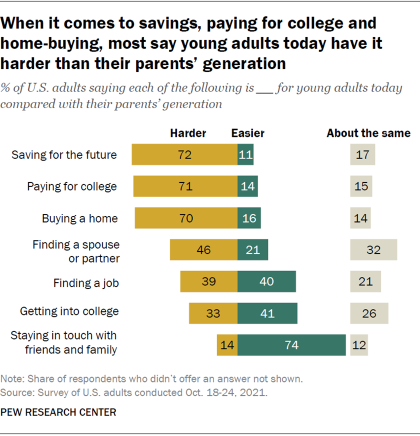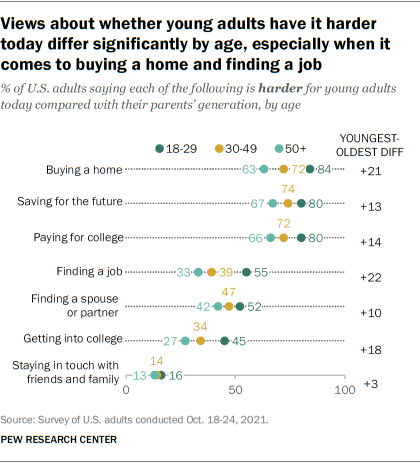
About seven-in-ten Americans think young adults today have a harder time than their parents’ generation when it comes to saving for the future (72%), paying for college (71%) and buying a home (70%), according to a Pew Research Center survey conducted in October 2021. These findings come at a time when younger Americans are more likely than previous generations to have taken on student debt with tuition costs steadily rising, and to face an affordable housing crisis as rent and housing prices have grown markedly faster than incomes in the last decade.
To learn more about how Americans view the circumstances young adults face across various life measures compared with their parents’ generation, Pew Research Center surveyed 9,676 U.S. adults between Oct. 18-24, 2021. Everyone who took part is a member of the Center’s American Trends Panel (ATP), an online survey panel that is recruited through national, random sampling of residential addresses. This way, nearly all U.S. adults have a chance of selection. The survey is weighted to be representative of the U.S. adult population by gender, race, ethnicity, partisan affiliation, education and other categories. Read more about the ATP’s methodology.
Here are the questions used for this analysis, along with responses, and its methodology.
There’s less consensus when it comes to assessing labor market outcomes for young people today compared with their parents’ generation. Similar shares say finding a job is easier (40%) as say it is harder (39%) for young adults today. A smaller share of U.S. adults (21%) say it’s about the same.
When it comes to finding a spouse or partner, Americans are more than twice as likely to say younger adults today have it harder than their parents’ generation (46%) than to say they have it easier (21%). Around a third (32%) say it’s about the same.
On some other measures, Americans are more positive in their assessments of young adults’ circumstances. A significant majority of U.S. adults (74%) say it is easier for younger generations today to stay in touch with family and friends. Only 14% say this is harder for young adults compared with their parents’ generation. A plurality (41%) says getting into college is easier for young adults today compared with their parents’ generation; 33% say it’s harder for young adults today and 26% say it’s about the same.
There are notable age differences when it comes to assessing the circumstances of young adults today.
While majorities across all age groups say young adults have it harder when it comes to buying a home, saving for the future and paying for college, Americans ages 18 to 29 are more likely than older age groups to say this. More than eight-in-ten adults younger than 30 (84%) say buying a home is harder for young adults today, while 80% say the same about saving for the future and paying for college. Among those ages 30 to 49, 72% say buying a home and paying for college is harder for young adults today, and 74% say this about saving for the future. Those 50 and older are the least likely to say these measures are harder for younger generations to reach, with 63% saying this about buying a home, 67% saying this about saving for the future, and 66% saying this about paying for college.
When it comes to finding a job, younger Americans are again the most likely to say this is harder for young adults today. Overall, 55% of 18- to 29-year-olds say finding a job is harder for young adults today than it was for their parents’ generation. About four-in-ten or less of those ages 30 to 49 and those 50 and older say this about young adults (39% and 33%, respectively). There are also double-digit differences between the views of adults younger than 30 and those ages 50 or older when it comes to finding a spouse or partner (52% of 18- to 29-year-olds say this is harder for young adults today vs. 42% in the older group) and getting into college (45% vs. 27%, respectively). In fact, a plurality of adults 50 and older say getting into college is easier today (44%). There are no large differences by age on the measure of staying in touch with family and friends.
Generally, these views differ only modestly by gender, with one exception. On finding a spouse or partner, about half of women (51%) – compared with 40% of men – say this is harder for young adults today than it was for their parents’ generation. This gap is only present among those ages 30 and older; roughly equal shares of women (53%) and men (52%) younger than 30 say this is harder for young adults today. Notably, women in older age groups give similar answers as younger women, while older men are less likely than their younger counterparts to say finding a spouse or partner is harder for young adults today (42% of men 30 to 49 and 34% of men 50 and older say this).
Finally, on most of these measures, there are no significant differences between adults who are parents of children ages 18 to 29 and those who are not. On a few items where such differences exist, they tend to disappear when looking at adults 50 and older. The only item where such differences persist among older adults is on assessments of finding a job. Interestingly, those 50 and older who are parents of adult children ages 18 to 29 are more likely than those in the same age group who do not have young adult children to say young adults today have it easier when it comes to finding a job (47% vs. 42%, respectively).
Note: Here are the questions used for this analysis, along with responses, and its methodology.

